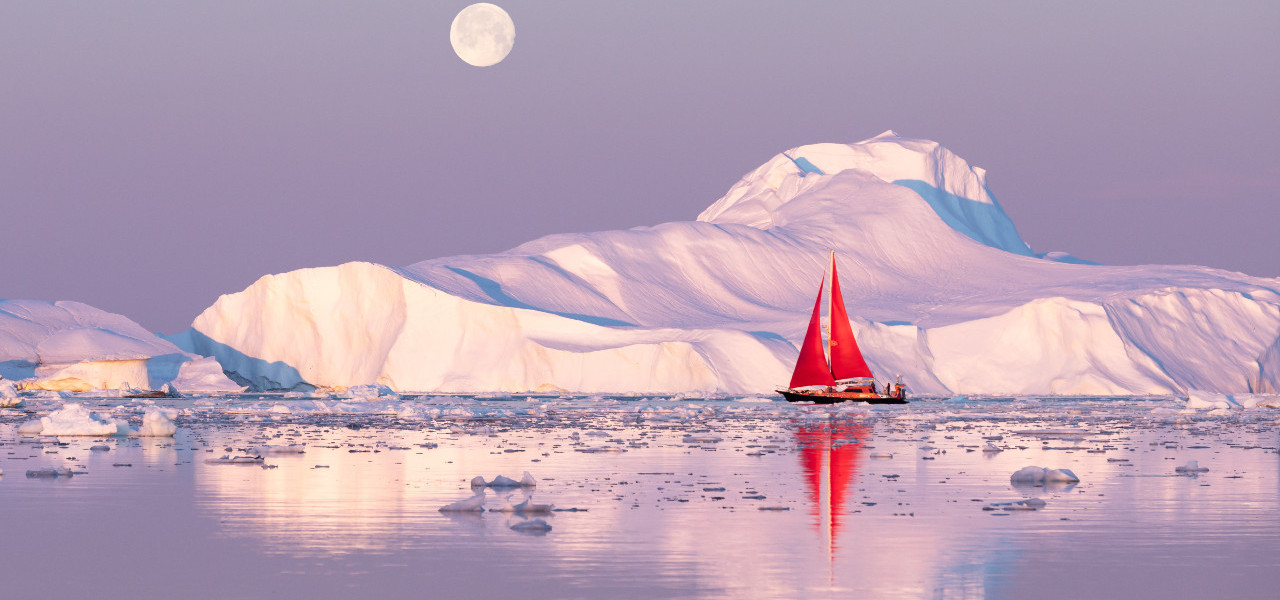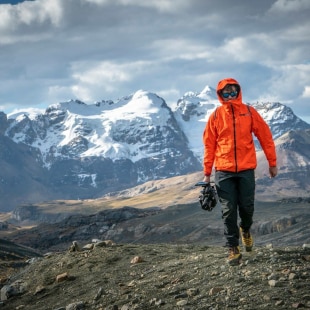The Arctic, an icy region of crucial importance
The Arctic, which covers an area of around 21 million square kilometers from the North Pole to the Arctic Circle, is a region coveted for its natural resources and tha is threatened by global warming. Since the 1990s, it has warmed twice as fast as the rest of the planet, leading to accelerated melting of the ice pack and endangerment of a rich and already threatened biodiversity.
The Arctic also constitutes a unique record of our planet’s evolution, that of its species and its climate. Hidden in the strata of the permafrost, this soil that has remained frozen for 10, 20 or even 30 thousand years, is a genuine archive of the living world, thanks to macro- and micro-organisms preserved by the region’s (very) low temperatures.
The melting of the permafrost is even more problematic in that it contains twice as much carbon as the earth’s atmosphere. As the ice pack breaks up, part of this carbon will be released in the form of CO2 - or worse, methane - thus further accelerating global warming.
The Last Glaciers - understanding the human impact of melting glaciers
In a soon to be released film, The Last Glaciers, Craig Leeson, BNP Paribas Sustainability Partner, travels to the worlds iciest spots seeking out scientists and experts to understand and explain how and why glaciers are melting and what the impact of this rapid change has on humanity and future generations.
The BNP Paribas Foundation supports scientific research
Aware of these risks, the BNP Paribas Foundation launched its Climate & Biodiversity Initiative program in 2010 to support numerous innovative research projects, with two key objectives:
- increasing scientific knowledge on the interactions between climate change and biodiversity;
- building public awareness around these issues.
Since 2010, it has supported and mobilised 27 research teams with a budget of €18 million, while also reaching more than 400,000 people in efforts to raise awareness of climate crisis issues.
Exploring the permafrost's ice memory
The research projects funded by the BNP Paribas Foundation include, in particular, studies concerning the melting of the permafrost whereby samples taken from glaciers threatened by global warming are extracted to preserve an “ice memory”. This initiative also involved a virtual reality experience in 2017. Furthermore, the BNP Paribas Foundation launched a new call for projects in Europe in 2019 and selected nine prizewinners whose studies observed interactions between climate and biodiversity and the effects of disruptions on human societies. The "Life without ice" research project is one such example.
Supporting young scientists in their research projects
Along similar lines, the BNP Paribas Foundation has established a partnership with the Swiss Polar Institute (SPI), a consortium of Swiss universities, to support research projects in the field of extreme environments and polar research, such as interactions between air and ocean, or ocean desalination.
Since 2018, the co-creation and support for the Polar Access Fund allows young scientists to conduct research projects associated with the polar regions and global warming issues. This partnership was recently renewed for three more years, from 2021 to 2023.
The central role of finance in the protection of nature and our oceans
BNP Paribas, one of the banking sector’s leaders in the fight against global warming, has a key role to play in contributing to the collective effort to achieve the SDGs. Its CSR strategy is fully aligned with several of these goals, notably Goal 13: Climate Action, Goal 15: Protect life on land, and Goal 17: Partnerships to achieve the Goals. Since 2011, BNP Paribas has therefore been using all the tools available to support clients in the transition to a low-carbon and environmentally friendly economy, financing renewable energies, products and services that foster energy efficiency and sustainable mobility.
BNP Paribas Sustainable Finance key figures
in green bonds structured and placed by BNP Paribas
.
devoted to financing renewable energies
in financing enterprises in favor of the energy transition and sectors considered to contribute directly to the SDGs
The Arctic Basecamp: low-temperature tents pitched at Davos to talk about global warming. BNP Paribas experts join in
For several years now, the Arctic Basecamp has been set up alongside the Davos World Economic Forum. It brings together climate experts, activists and sustainable development players in a unique place: a re-creation of an Arctic scientific basecamp, with the goal of bringing change actors together to exchange views and contribute to emergence of solutions.
BNP Paribas experts participate in this event. In view of the health crisis, the 2021 edition took place on January 27 in the form of a global virtual event with the participation of sustainable development leaders and celebrities – but without abandoning the low-temperature camping initiative in which Gwen Yu, Head of Engagement Transformation at BNP Paribas, participated in the company of scientific experts.
“Science and data must chart the transition pathway towards a low carbon economy. To scale up climate action means understanding our environmental impact and coalitions are vital in this process. This includes supporting climate change and biodiversity research.” Gwendolyn Yu, Head of Engagement Transition, BNP Paribas
Arctic vulnerability leads the Group to further commitments
The Bank has policies overseeing its activities in certain sectors. For example, as of 2018, it ceased working with enterprises and infrastructure whose main activity is exploration, production and export of shale oil, shale gas and oil sands. The greater vulnerability of the Arctic region, in climate and biodiversity terms, has led the Group to take its commitment further and to stop supporting oil or gas exploration and production projects in the Arctic National Wildlife Refuge


